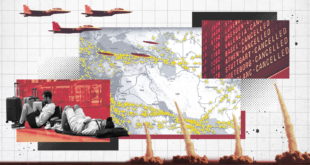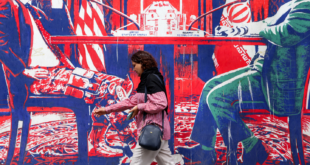Anti-government protesters in Bulgaria are growing impatient with Prime Minister Boyko Borissov’s unwillingness to resign – but are also aware that they are in this for the long haul.
Corruption, over-influential oligarchs, doubtful media freedom, environmental problems, general absurdities. All of this defines the current anti-government protest wave across Bulgaria, the biggest seen in years, even in decades.
Almost one month in, the protesters are digging in for the long haul, well aware that victory may take time.
“I think about the future of the protests in the same way that an entreprenteur would look at a future project with a risk investment,” suggests 42-year old Mihaela, who recently came back full-time from the UK with her husband and two sons.
“The new beginning will be tough – but there must be a positive thinking that no matter how hard the road to success is, no matter what obstacles there will be in the way, or whether we see the perfect end results, this is all part of the process, ” she told BIRN.
“If we’re scared of everything, we won’t make any change,” she added.
Her whole family has been present at the protests, with both of their sons as well.
As Mihaela talks, the legendary Pink Floyd protest song Another Brick in the Wall fades out in the background near Sofia University – which is where she enrolled in the late-1990s.
“Whoever comes after the current government might not resolve the situation. What’s important is that the next lot in power will be aware that there is a society that may take to the streets again,” she reflected.
She is suspicious of how the current events are being portrayed in he media, “even the America-funded ones”, and expresses a certain disillusionment with the West.
The recent anti-government protest wave started both spontaneously and as a result of a slowly boiling anger about rampant corruption, long-standing ties between the government and over-influential oligarchs, massive over-construction on the coast and other environmental problems.
It was also sparked by Bulgaria’s relentless decline in the World Press Freedom index, and by the insufficient measures taken by the government towards those sectors most affected by the recent COVID pandemic.
As of August 6, the protests against the government of Prime Minister Borissov and against Prosecutor General Ivan Geshev had continued for 28 days, making it the biggest protest wave the country had seen since 2013-2014.
The protests continue, moreover, despite Borissov’s move to sacrifice various ministers, including Finance Minister Vladislav Goranov, Economy Minister Emil Karanikolov and Interior Minister Mladen Marinov – all of whose futures were first discussed on July 16, when Borissov called for their resignations over alleged ties to the oligarch and politician Delyan Peevski.
Protests abroad in support of the events in Bulgaria are also continuing. Another specific trait of the current demonstrations is the active participation of smaller towns and cities, with roads being blocked in Varna, the biggest town on the Black Sea coast, for example.
In the early hours of the protest on Tuesday, between 6pm and 8 pm, the protest spaces resemble a festival, as parents with children, cyclists and skaters all take to the streets before the crowding begins.
“We have reclaimed the city”, “Don’t you feel the air is cleaner?” and, “The protest has done more about widening the pedestrian and bicycle zones than everyone in power has done so far”, are some of the phrases and thoughts overheard in people’s conversations.
Others, however, are calling for more centralized and radical actions, since the protest has become becoming torn between three main spots in the city – the Council of Ministers, or government, near the Presidency, Sofia University and Eagles’ Bridge, which is where the camp has turned into an “alcohol-free zone” and later in the night the whole crowd gatherd.
Posters around some the tents indicate that the bridge is now called “Pumpkin Street” – “pumpkin” being one of the nicknames people have given to PM Borissov.
“People are tired from all the corruption scandals that follow the current government,” said 44-year old documentary director and producer Svetoslav Draganov, who has been protesting night and day, often with his family.
“They are also tired of the fake concern that Prosecutor General Ivan Geshev is trying to project,” he added.
In recent weeks Geshev, always with a cap on during his public appearances – which has given him the nickname “The Cap” – is often seen around smaller towns in Bulgaria, supposedly locked in combat with domestic crimes.
On his social media, he recently posted a video of him talking to an elderly woman who had been raped. It has spawned claims that Geshev is using people’s misery to his own benefit.
Ruling party accused of feeding on fear
Draganov said that for years the government of Boykov’s centre-right GERB party had fed on popular fear that, were if not for them, the Bulgarian Socialist Party, the heirs to the old communist regime, would be back in power.
Now that fear had gone, he said. “The fear that ‘the communists will come back again’ has been marginalized. People won’t fall for that this time and are fully aware that change needs to happen,” he said.
“I was one of those who just closed their eyes to everything that was happening and didn’t take a stand because I thought it wouldn’t change anything, and was consumed with my work. But the pandemic gave me time for thought. Suddenly we were alone with the TV and the government’s rhetoric – and things became insufferable,” he said.
He said the scandal over the oligarch Vassil Bojkov, who had his lottery business taken away, and others, had been turning points in helping people realise how many dirty games were being played at the same time.
He also recalls the actions of Hristo Ivanov, the leader of opposition Yes, Bulgaria party, as one of the triggers of current events. A viral video of Ivanov inspecting the allegedly illegal seaside mansion of an oligarch helped spark the initial rallies.
“My great hope is that honest politicians will visit the smaller places in Bulgaria and explain their ideas to the people, because democracy is played out in elections and the battle will be won when the people are won,” he said.
A 31-year old musician, Konstantin Kuchev, meanwhile keeps people’s spirits up with performances held around the different protest spots, both day and night, at which he gives well-known local songs a different twist.
Despite the frequent discussions about in what ways the current protest wave is similar to the anti-government demonstrations of 2013-2014, or to the events of 1989, or the mid-1990s, he has an overwhelming feeling that something new is happening.
“This time around, people are more aware about how much work needs to be done so that our politics can get cleaner and transparent, ” he said. “We see the size of the problem much better.”
Kuchev added : “I also think that the government fears what will happen because it is getting harder and harder to fool the people. The politicians’ ways of distracting the momentum of the protest are pathetic,” referencing the wave of resignations in the GERB party designed to defuse the protests.
“There’s a wide crack in the system. That also gives us more responsibility, how to change it,” he concluded.
 Eurasia Press & News
Eurasia Press & News


